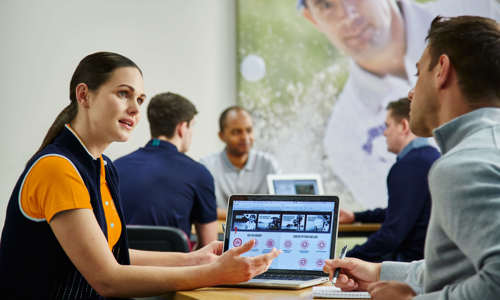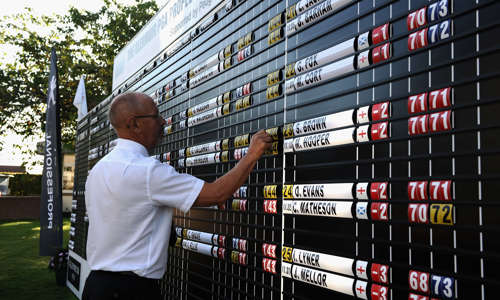In its relatively short lifetime the Augusta National Women's Amateur has seen some highly impressive winners – Jennifer Kupcho won the inaugural event in 2019 and since then we have seen Tsubasa Kajitani, Anna Davis and Rose Zhang emerge victorious over Augusta National's hallowed grounds. This year saw England's Lottie Woad become the first European to win the event, the 20-year-old from Farnham converting a birdie putt on the 18th green to take the title.
On the bag of the Florida State sophomore student was PGA Professional Steve Robinson, who – along with her swing coach Luke Bone – is a vital part of Lottie’s team. He explains what it took for Woad to win around Augusta and what makes the now World No. 2 amateur quite so special.
When did you first make it to Augusta?
After watching it on television since I was 11, it took me 48 years to get there. The first time was when they had the ANWA. We had a number of players in the States who had qualified so I went out in my England Golf role to support those players. I think we had four last year with England Golf; Amelia Williamson, Caley McGinty, Charlotte Heath and Lottie who I caddied for. This year we only had Lottie in but she was ranked number four in the world rankings and we felt, as a performance department at England Golf, that we should support her in trying to get to World No. 1 if we could.
Why did you caddy for Lottie last year?
It was her first year in the States and we had worked together on her pitching, short game and some performance bits. She has worked with PGA Professional Luke Bone on her swing since forever, and he has done a great job, and she will also come and see me in Yorkshire when she is back home. We will work on the performance stuff and the mapping and planning of the course.
How much planning goes into a course like Augusta National?
A lot. It is all about managing the pins and hitting the ball into the correct zones. The short par-4 3rd would be a great example, with the pin in the back right section of that green, and you just want to make a four and get out of there and move on. My favourite hole is definitely the 13th, it is such a great risk-and-reward hole. You hit a great tee shot and then you have got a decision to make. You hit a bad tee shot and you have a decision to make. Depending where the pin is you have got a decision to make. It is just a very strategic and tactical, risk-and-reward golf hole.
How surreal was it to watch your player finish like she did and win at Augusta?
It was incredible to see it unfolding in front of my eyes. After she made six on 13, and she was on the clock and it flustered her a little, I had a bit of a word with her and, from then on in, it was like watching a movie. We were just very calm on working the numbers and doing the job. She knew that there were opportunities with those pins coming in. Obviously, Matt [Fitzpatrick] winning a Major was massive, and I don’t shed a tear often, but I did then. And I would say this was just as big because you see a young player showing their potential at 20 years old. One of the nicest things for me personally – aside from the joy of Lottie’s win – was when I went back to the caddy shed, and they said that they would send me the boiler suit to my home address, dry cleaned and pressed. That is what the winning caddy gets. That really brought it home to me.
How did you keep your cool, being in the hunt with a player at Augusta?
I have been an advisor on the course for years, we have been to six European finals and I advise multiple players so I am quite used to doing it. My bit is knowing when to step in and when to step away. I think that is the art form so it didn’t really bother me. We were there to do a job and we talked before the final round that somebody would come out of the pack, and they probably would overtake her score, and for her not to be too surprised about that. And obviously we would have the advantage of knowing that, and still having holes left to play. At 61 years old, I have been around a bit and I don’t get that excited really. It is just good to be in contention, you can’t guarantee that you are going to win or lose but, if you plan correctly, you can increase the probability. The only time I got a little bit excited was on 17, after a birdie there we knew that she was level and had a real shout. Then she absolutely smashed it up 18.





































